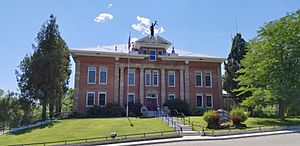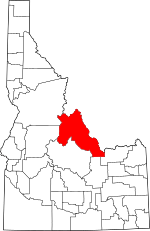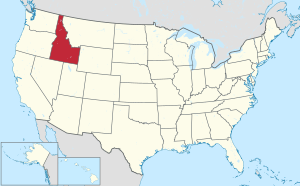Lemhi County, Idaho facts for kids
Quick facts for kids
Lemhi County
|
||
|---|---|---|

Lemhi County Courthouse in Salmon
|
||
|
||

Location within the U.S. state of Idaho
|
||
 Idaho's location within the U.S. |
||
| Country | ||
| State | ||
| Founded | January 9, 1869 | |
| Named for | Fort Lemhi | |
| Seat | Salmon | |
| Largest city | Salmon | |
| Area | ||
| • Total | 4,569 sq mi (11,830 km2) | |
| • Land | 4,563 sq mi (11,820 km2) | |
| • Water | 5.4 sq mi (14 km2) 0.1% | |
| Population
(2020)
|
||
| • Total | 7,974 | |
| • Estimate
(2023)
|
8,441 |
|
| • Density | 1.74524/sq mi (0.67384/km2) | |
| Time zone | UTC−7 (Mountain) | |
| • Summer (DST) | UTC−6 (MDT) | |
| Congressional district | 2nd | |
Lemhi County is a county in the state of Idaho. It was created in 1869. The county is named after Fort Lemhi, an old settlement.
As of the 2020 census, about 7,974 people lived here. The biggest city and the main town for the county government is Salmon.
Contents
Geography of Lemhi County
Lemhi County covers a total area of about 4,569 square miles. Most of this area is land. It is the fourth-largest county in Idaho by size.
The highest point in the county is Bell Mountain. It stands tall at 11,612 feet (3,539 meters) above sea level. The lowest point is along the Salmon River. This river flows through the middle of the county.
The eastern border of Lemhi County follows the Continental Divide. This is a line of high peaks where rivers on one side flow to the Pacific Ocean and rivers on the other side flow to the Atlantic Ocean.
Neighboring Counties
Lemhi County shares borders with several other counties:
- Idaho County, Idaho – to the northwest
- Ravalli County, Montana – to the north
- Beaverhead County, Montana – to the northeast
- Clark County, Idaho – to the east
- Butte County, Idaho – to the south
- Custer County, Idaho – to the southwest
- Valley County, Idaho – to the west
Protected Natural Areas
Parts of these national protected areas are found in Lemhi County:
- Challis National Forest
- Salmon National Forest
- Targhee National Forest
- Frank Church—River of No Return Wilderness
History of Lemhi County
Early Native People
People have lived in the Lemhi and Salmon River valleys for about 14,000 years. The early native people were skilled hunters. The Lemhi band of the Shoshoni tribe lived here. They were also known as "Salmon Eaters."
The Shoshoni people were very good at hunting and fishing. They fished for salmon in the Lemhi Valley during the summer. In spring, they gathered camas plants. They also hunted buffalo near the Missouri River. They traveled a lot and traded with other tribes.
In 1875, the Lemhi Shoshoni were forced to move to a reservation. This reservation was later closed in 1907. The tribe then moved to Fort Hall.
Explorers and First Settlers
The famous Lewis and Clark Expedition entered Idaho in Lemhi County on August 12, 1805. Meriwether Lewis and his team were the first Americans of European descent to explore this area. Their guide, Sacagawea, was born in the Lemhi Valley. Her brother was even a chief of the Lemhi Shoshoni.
Later, in 1822, fur traders like Michael Bourdon set up operations in the Lemhi Valley. This area was important for trapping for about 20 years. Mormon settlers also built Fort Lemhi here from 1855 to 1858. However, they left after an attack by native people.
Mining and New Towns
Gold was discovered in Lemhi County in 1862. This brought many miners to the area. A big gold strike happened at Leesburg in 1866. This led to a "gold rush" as many people came seeking their fortune.
More gold was found in other places like Lemhi and Shoup. Salmon City became the main town for Lemhi County when the county was officially formed in 1869. Other mining towns like Gibbonsville and Gilmore also grew.
A railroad was built in 1910 to help transport ore from Gilmore. However, the railroad stopped running in 1940.
How Cities Grew
Salmon City was planned out in 1867. It became a legal city around 1900. Other towns like Leadore and Patterson were also formed. Patterson later became an unincorporated community.
Population Information
| Historical population | |||
|---|---|---|---|
| Census | Pop. | %± | |
| 1870 | 988 | — | |
| 1880 | 2,230 | 125.7% | |
| 1890 | 1,915 | −14.1% | |
| 1900 | 3,446 | 79.9% | |
| 1910 | 4,786 | 38.9% | |
| 1920 | 5,164 | 7.9% | |
| 1930 | 4,643 | −10.1% | |
| 1940 | 6,521 | 40.4% | |
| 1950 | 6,278 | −3.7% | |
| 1960 | 5,816 | −7.4% | |
| 1970 | 5,566 | −4.3% | |
| 1980 | 7,460 | 34.0% | |
| 1990 | 6,899 | −7.5% | |
| 2000 | 7,806 | 13.1% | |
| 2010 | 7,936 | 1.7% | |
| 2020 | 7,974 | 0.5% | |
| 2023 (est.) | 8,441 | 6.4% | |
| U.S. Decennial Census 1790–1960 1900–1990 1990–2000 2010–2020 2020 |
|||
In 2010, there were 7,936 people living in Lemhi County. Most people, about 96.4%, were white. About 2.3% of the population was of Hispanic or Latino origin.
Many people in the county have German, English, or Irish family backgrounds. The average age of people living here was about 49.7 years old.
Communities in Lemhi County
Cities
Unincorporated Communities
These are smaller towns or areas that do not have their own local government.
Education in Lemhi County
Students in Lemhi County attend schools in these districts:
- Challis Joint School District 181
- Salmon School District 291
- South Lemhi School District 292
College of Eastern Idaho also serves this county, offering college-level education.
See also
 In Spanish: Condado de Lemhi para niños
In Spanish: Condado de Lemhi para niños
 | William L. Dawson |
 | W. E. B. Du Bois |
 | Harry Belafonte |


